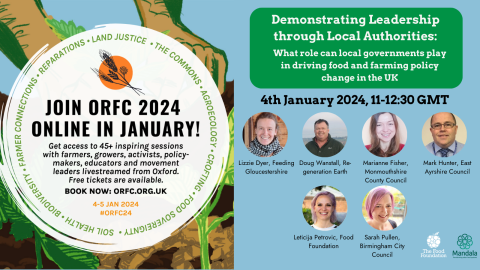16 January 2024
Six key takeaways from the Oxford Real Farming Conference
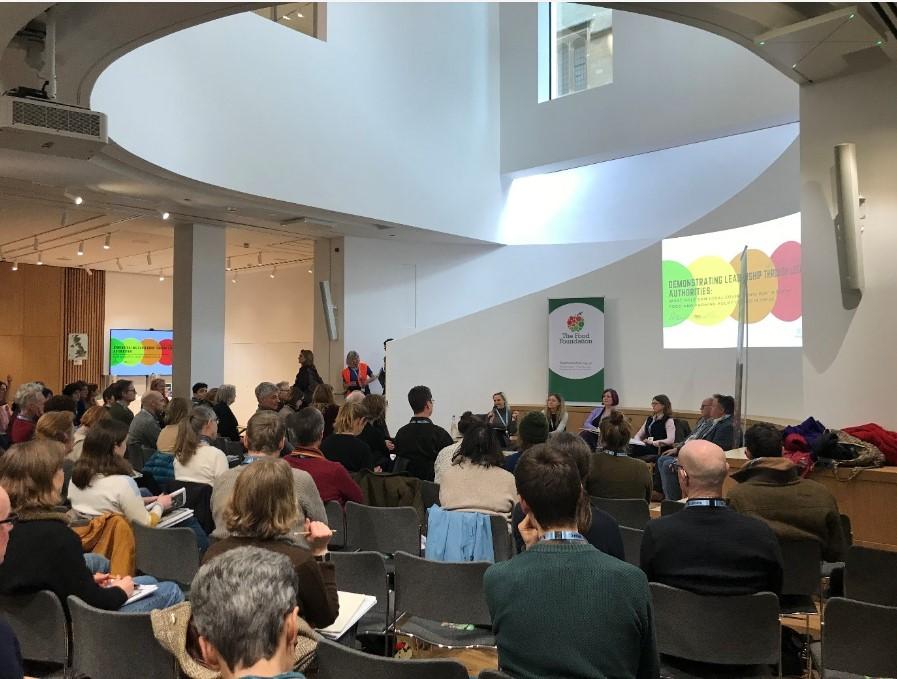
Moving towards growing acceptance of the agroecological movement – reflections on the Oxford Real Farming Conference 2024
The Oxford Real Farming Conference 2024, now the largest agroecological gathering in the world, celebrated its 15th anniversary this year.
What started as a fringe event to the Oxford Farming Conference (OFC), focused on more conventional farming, is now a global gathering that brings together more than 400 speakers and 2,000 delegates joining the conference in person, and with many more joining online.
Farmers, producers, civil society, academics, journalists, and more recently increasing number of policy makers, come together to explore radical ideas for transforming food and farming system, putting agroecology at the centre of transformation.
The convergence of diverse perspectives fostered a rich dialogue and discussion about transitioning to agroecological food production and associated opportunities and challenges this could bring for achieving our planetary and population sustainability and health goals.
The quality of the speakers and the sessions points to the fact that agroecology no longer sits on the fringes of food and farming conversations.
For the first time this year the Food Foundation also had a pleasure of hosting a session at The Policy Hub. Curated by Sustain, it featured series of panel discussions which had strong focus on the role of policy in food and farming system transformation.
Whilst it was my first time attending the conference in person, I still thought I knew what to expect – a majority farmer audience, and less interest in policy sessions.
It therefore came as a genuine surprise when almost half of the audience raised their hand at the start of our panel session, when asked about who in the room is involved in policy making!
Our session at ORFC
In hindsight, with local and general elections happening this year, and after two days of attending some incredibly powerful sessions which referenced the important role of employing policy levers at all levels to achieve change, it shouldn’t come as a surprise that interest in policy discussions at ORFC is growing stronger each year.
Nevertheless, whilst food and farming policy is gaining momentum, absence of national policy makers who traditionally still prefer attendance at OFC was noticeable.
What did we learn?
In the session hosted by The Food Foundation "Demonstrating Leadership through Local Authorities" the panel discussed the vital role local governments play in catalysing change within our food systems, acting as policy entrepreneurs that can influence and complement, rather than replace national policy.
Discussions underscored the power, resources, and influence local authorities have in forms of planning, procurement, infrastructure and council assets which can enable major shifts in local food economies and cultures.
Despite these strides, challenges persist. Financial pressures and a lack of dedicated capacity often hinder local authorities' ability to drive the food and farming agenda using systems approach.
However, some trailblazing councils are taking bold actions, aligning food actions with social values like job creation and local investment, and prioritising sustainable food production and reduction in health inequalities.
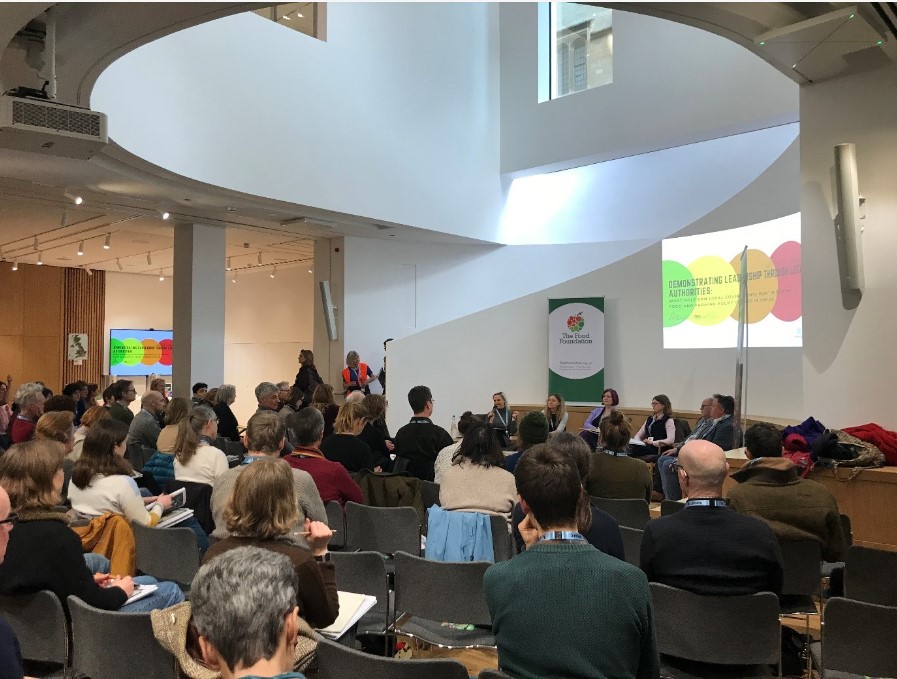
Demonstrating Leadership Through Local Authorities
On the panel we heard from Sarah Pullen from Birmingham City Council who highlighted the complexities and funding challenges faced by local authorities, but also the important role of Food System team, which can play a key role in connecting stakeholders from other teams including planning, procurement, environmental health and net zero to ensure food is embedded across all council strategies and plans.
Lizzie Dyer from Feeding Gloucestershire Food Partnership brought to light distinct challenges of rural areas, noting disparities in job availability and infrastructure that can facilitate rural development and Marianne Elliot, representing Welsh local authority raised the importance of collaboration and co-designing programs and projects to support farmers in Monmouthshire who are looking to adopt regenerative farming practices.
From Scotland, Mark Hunter, Facilities and Estates Lead at East Ayrshire Council, spoke about the important levers that local authorities have in the form of public procurement for creating new market avenues for local organic producers to supply schools within the council area.
Similarly, Doug Wanstall, regenerative farmer from Kent shared his family farm's experience working in both short and long supply chains, highlighting those opportunities for direct supply of local schools, as a preferred route to market to dealing with large retailers.
He also emphasised the significant impact of their collaboration with the University of Kent in advancing regenerative farming methods and underscored the necessity of a systemic approach to tackle the multifaceted inequalities in food system, saying: "We have a food system that pays no attention to health and a health system that pays no attention to food".
Reconciling Farming and Academic Research
The importance of academic partnerships to bolster the case for bridging the disconnect between farmers and researchers in transition to agroecological farming was mentioned across a number of sessions. The need to advocate for co-created research that aligns with farmers' needs would recognise the expertise of innovative farmers and challenging the pitfalls of what is sometimes considered “extractive” research relationship.
Agroecological Farming and Net Zero Transition
As always significant theme during the conference was the role of agroecological farming in the transition to net zero, delving into the impact of current agricultural practices on biodiversity loss and carbon emissions
John Gummer, highlighted that the existing approach to land use, focuses predominantly on altering agricultural practices, whilst overlooking the broader, nuanced challenge of managing a nation's most precious resource - its land.
The proposal for a Department of Land Use, was suggested as an integrated approach that would bring together planning, agriculture, and environmental concerns under a single authoritative umbrella.
Challenging the Cheap Food Narrative
A session organised by Food, Farming and Countryside Commission (FFCC) entitled "So is it really all about cheap food?" explored the public opinion on sustainable farming.
It presented findings from its latest report National Conversation About Food which indicate a strong desire from the citizens for government incentives for environmentally friendly farming and food production.
The session also highlighted the public's support for fair payment to farmers and the expectation for government intervention in complex food system issues, challenging the dominant narrative that cheap food is always the preferred option and that there is a low consumers’ willingness to pay more for quality food.
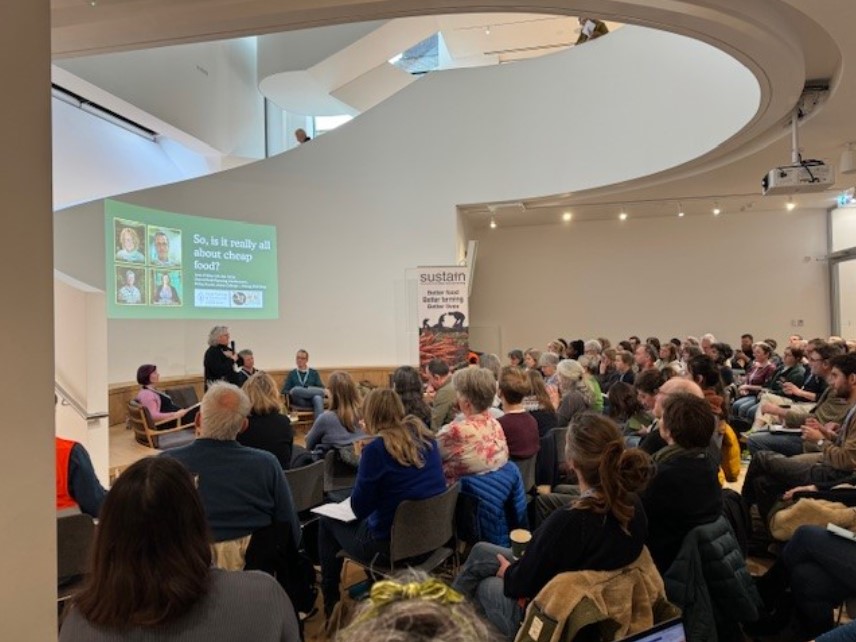
The Food Farming and Countryside Commission session
Public Procurement as a Catalyst for Change
The last session of the Conference held at the Policy Hub brought farmers, academics and local food partnership leads to discuss the potential of public sector food procurement to support creation of shorter supply chains and rewarding agroecological production methods.
Examples of successful local government procurement initiatives were shared from Wales, where local authority is working in partnership with a local courgette grower on a pilot which would see more agroecologically grown Welsh veg supplied into local schools.
In Leicestershire, efforts are also being made to focus on procuring more agroecological produce from local farmers.
By demonstrating the positive impact in reduction of carbon that can be achieved from procuring from high standard local producers councils can achieve their net zero and climate commitments and secure senior leadership buy in to shift procurement to more local and agroecological food procurement.
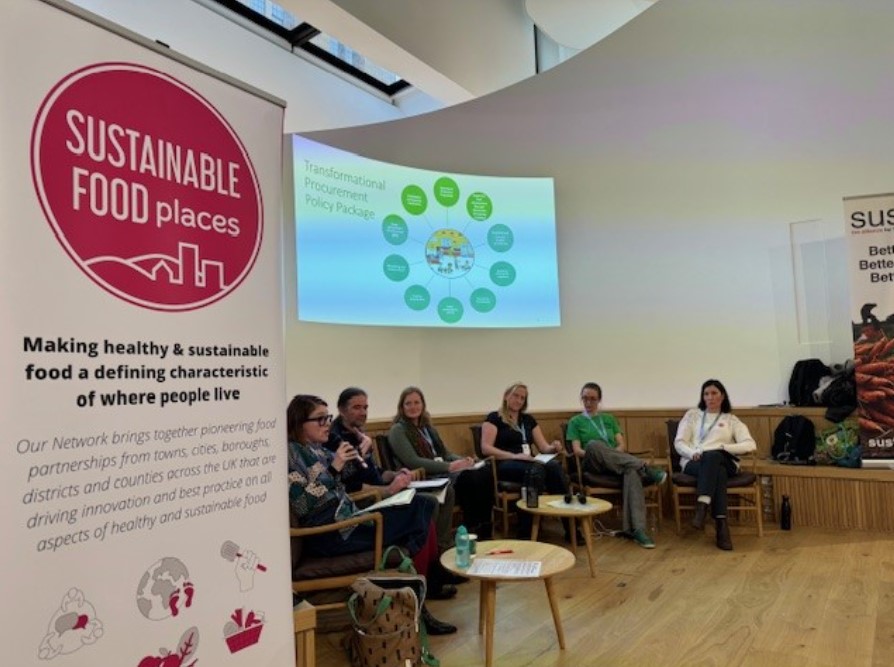
The Sustainable Food Places session
Nevertheless, changing local procurement processes and contracts still remains a long term goal.
To help achieve this, Kelly Parsons from Mandala Consortium talked about procurement as a policy package and the importance of convening various stakeholders involved in procurement, catering, and food production to collaboratively work within their specific contexts.
Key Takeaways
With 120+ session taking place over the course of two days it was impossible to grasp the full breadth of conversations, but these are some of the threads that stuck with me:
The Balancing Act: The intricate balance between meeting our nation’s objectives for nature, climate, and food security means that achieving these goals without some trade-offs remains a complex puzzle, with no full consensus yet. The quest to find common solutions among these objectives continues to be a driving force in how we drive conversation around more sustainable agriculture transition.
Livestock Farming – Still a Contested Terrain? The debate around livestock farming was as always particularly heated. Amidst the disagreement, there was a ray of consensus on the role of grassland livestock farming, with focus being on less but better quality meat, which when managed sustainably can also be beneficial for biodiversity and carbon capture – key components in our journey towards net zero.
Agroecological Farming – A Shared Vision with Hurdles: There’s a growing recognition of the need for a transition to agroecological farming. However, the path is fraught with barriers – from overcoming perception that transitioning to agroecological farming practices to policy and financial constraints. These obstacles highlight the need for a more supportive framework to enable this critical transition.
Local Initiatives – Seeds of Change: This year ORFC also showcased a range of innovative pilots and projects happening at the local level. These initiatives are highlighting what’s possible when communities and local authorities work in partnership to change their local food systems.
Power Dynamics in the Food System: An aspect of the discussions was the acknowledgement of the significant imbalances of power within the food system. The dynamics between retailers and farmers, the influence of Big Ag in global policy-making, and the often-overlooked struggles of migrant workers were prominent. These issues call for continuous revaluation of how we want power to be distributed and exercised in our food systems.
The Food Security 'Dilemma': We need to continue to challenge the narrative that changes to more sustainable practices pose a threat to food security, a notion often used to justify the status quo. Contrary to the dominant 'cheap food’' narrative, there’s a growing understanding that people desire food that upholds health, environment and sustainability standards and fair compensation for farmers, even though the reality of affordability remains a hurdle for many.
What next?
The ORFC 2024 was a testament to the growing consensus on the urgent need for accelerating transition to sustainable agricultural practices and the significant role of policy and research in supporting the case for transition to more localised, resilient and agroecological production system.
But the journey towards a better food and farming system in UK, and globally is as challenging as it is necessary. Nevertheless the conference not only highlighted the hurdles but also showcased the resilience, innovation, and collective will to navigate these complexities.
Looking ahead to next year, there’s a palpable sense that we need to delve deeper into the interplay between diets and nature-friendly farming practices.
The Food Foundation is looking forward to bringing more policy discussions to ORFC next year that could also highlight opportunities for other food system actors, including businesses and investors to play a more important role in creating a healthier and more sustainable food system.
In the meantime, we remain inspired by the amazing work of individuals as well as groups and organisations who are paving the way in driving the food and farming system change.
To quote Francesca Price, ORFC conference director, who at the start of the conference introduced a 17th century term meaning fresh hope - "respair” is the essence of what the Oxford Real Farming Conference aims to instil in its attendees, and it certainly did in me!


